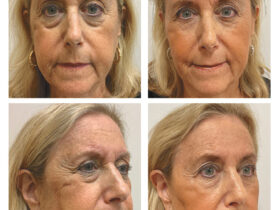Tobacco Free Florida is encouraging smokeless tobacco users to set a quit date and create a personalized quit plan during Through with Chew Week. Through with Chew Week is February 18th to the 24th. It is aimed to raise awareness about the dangers of smokeless tobacco use (chew, dip and snus) and the many effective resources available to quit, including Tobacco Free Florida’s free Quit Your Way tools and services.
“Most smokeless tobacco users do not realize that chew, dip, and snus are not a safe alternative to smoking. Smokeless tobacco products contain cancer causing chemicals. Repeated use of smokeless tobacco can have detrimental effects on a person’s health. That is why Through with Chew Week is so important to help bring awareness about how impactful smokeless tobacco can be on your health,” said Nina Garcia, Tobacco Prevention Program Manager at the Florida Department of Health in Collier County (DOH-Collier).
Smokeless tobacco is not harmless and can lead to nicotine addiction.1 Smokeless tobacco causes cancer of the mouth, throat, and pancreas, as well as increased risk of death from heart disease or stroke.2,3 In fact, smokeless tobacco users have an 80 percent higher risk of oral cancer and a 60 percent higher risk of esophageal cancer and pancreatic cancer compared to non-users.4
Students Working Against Tobacco (SWAT) events will be taking place during Through with Chew Week in Collier County, which includes a cleanup of the SWAT adopted canal in Golden Gate. Posters will also be displayed in middle and high schools to educate students on the facts about smokeless tobacco products.
While smokeless tobacco use among Florida youth (ages 11-17) has decreased throughout the years, many rural communities have significantly higher prevalence rates. The current youth smokeless tobacco rates in some of Florida’s rural communities are two to four times higher than the state average.5
The 2016 Florida Youth Tobacco Survey (FYTS) revealed that 16.3 percent of youth aged 11-17 have tried smokeless tobacco, cigarettes, or cigars in Collier County. Collier County is fortunate that the youth smoking rate is not as high as the state average of 18.5 percent. Although Collier County’s youth smoking rate is not as high as the state average, there is a continual need to educate Collier County’s youth population on the health effects of smokeless tobacco like traditional inhaled tobacco products. By working together, the community can help decrease the rates of youth smokeless tobacco use in Collier County.
Tobacco Free Florida offers free tools and services for Floridians looking to quit any form of tobacco, including smokeless. Those looking to quit can call 1-877-U-CAN-NOW (1-877-822-6669) or visit www.tobaccofreeflorida.com/quityourway.
About the Florida Department of Health
The department, nationally accredited by the Public Health Accreditation Board, works to protect, promote and improve the health of all people in Florida through integrated state, county and community efforts.
Follow us on Twitter at @HealthyFla and on Facebook. For more information about the Florida Department of Health please visit www.FloridaHealth.gov.
About Tobacco Free Florida
The department’s Tobacco Free Florida campaign is a statewide cessation and prevention campaign funded by Florida’s tobacco settlement fund. Since the program began in 2007, more than 212,000 Floridians have successfully quit using one of Tobacco Free Florida’s free tools and services. There are now approximately 451,000 fewer adult smokers in Florida than there was 10 years ago, and the state has saved $17.7 billion in health care costs.6 To learn more about Tobacco Free Florida’s Quit Your Way services, visit www.tobaccofreeflorida.com or follow the campaign on Facebook at www.facebook.com/
TobaccoFreeFlorida or on Twitter at www.twitter.com/tobaccofreefla.
1 Cancer Prevention & Early Detection Facts and Figures 2010.
2 World Health Organization. IARC Monographs on the Evaluation of Carcinogenic Risks to Humans. Volume 89: Smokeless Tobacco and Some Tobacco-Specific N-Nitrosamines. Lyon (France): World Health Organization, International Agency for Research on Cancer, 2007 [accessed 2018 Oct 18].
3 Piano MR, Benowitz NL, Fitzgerald GA, Corbridge S, Heath J, Hahn E, et al. Impact of Smokeless Tobacco Products on Cardiovascular Disease: Implications for Policy, Prevention, and Treatment: A Policy Statement from the American Heart Association. Circulation 2010;122(15):1520–44.
4 Boffetta, P, et al., “Smokeless tobacco and cancer,” The Lancet 9:667-675, 2008.
5 Florida Youth Tobacco Survey (FYTS), Florida Department of Health, Bureau of Epidemiology, 2018.









